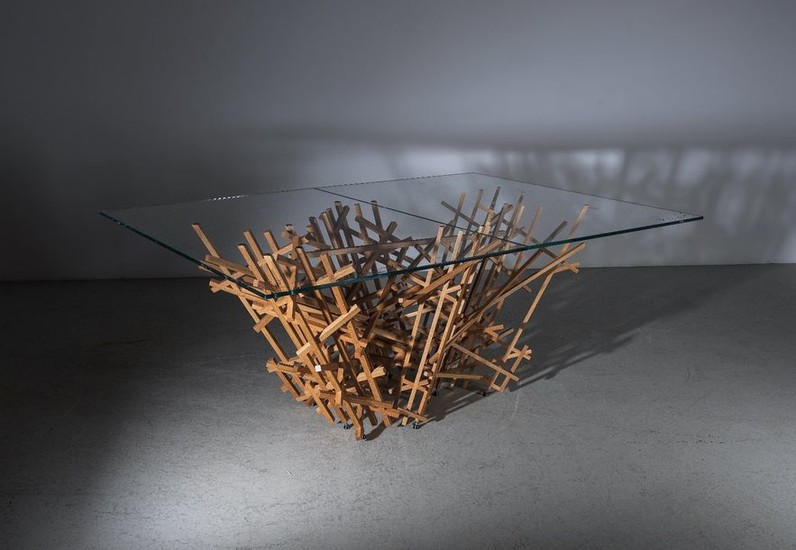Kengo KumaA Mock Up of the “Kigumi Table”...
Kengo KumaA Mock Up of the “Kigumi Table” Design, designed by Kengo Kuma,
2018, two-part support made of oak slats, cross-section 20 x 20 mm, two-part rectangular clear glass tops. Height c. 74 cm, width c. 184 cm, depth c. 130 cm. (MHA)A unique piece.
This mock-up was presented to Kengo Kuma in his office on 14.05.2018 as part of the design development process for the "Kigumi Table". The "Kigumi Table" is produced in a limited edition of 10 examples plus 2 (one épreuve d'artiste and one manufacturer's proof). This mock-up is a unique item, and was signed by Kengo Kuma thrice - once on each of the two glass halves and once on the frame.
Kengo Kuma was born in Yokohama, Japan, in 1954 and in 1979 he completed his master's degree at the University of Tokyo. After his studies at Columbia University, he founded Kengo Kuma & Associates in 1990. 2009, he was appointed professor at the Graduate School of Architecture, University of Tokyo. Kengo Kuma's major works include the Kirosan Observation Deck (1995) and the Batomachi Hiroshige Museum (1995). His recent works include the Yusuhara Wooden Bridge Museum (2010), the Asakusa Cultural and Tourism Center (2012) and the Kabukiza Theater in Tokyo's Ginza district (2013). Outside Japan, the Besançon arts and culture centre, the FRAC arts centre in Marseille and the Aix-en-Provence music conservatory were completed in 2013. Around 100 projects are underway in Japan, Europe, the USA, China and many other Asian countries. Kengo Kuma & Associates is also involved in the design of the new National Stadium in Japan. Kuma is also a successful writer. His works include "Anti-Object", which has been translated into English. Most of his most recent titles have been published in English, Chinese and Korean and have gained wide readership around the world.
"For me, a table is an intensely interpersonal thing. It signifies rest, communion, nourishment, thought, and conversation, together with others and sometimes by myself. Kengo Kuma.
"You could say that my aim is 'to recover the place'. The place is a result of nature and time; this is the most important aspect. I think my architecture is some kind of frame of nature. With it, we can experience nature more deeply and more intimately. Transparency is a characteristic of Japanese architecture; I try to use light and natural materials to get a new kind of transparency". (Kengo Kuma) Automatically translated by DeepL. To see the original version, click here.
View it on
Estimate
Time, Location
Auction House
Kengo KumaA Mock Up of the “Kigumi Table” Design, designed by Kengo Kuma,
2018, two-part support made of oak slats, cross-section 20 x 20 mm, two-part rectangular clear glass tops. Height c. 74 cm, width c. 184 cm, depth c. 130 cm. (MHA)A unique piece.
This mock-up was presented to Kengo Kuma in his office on 14.05.2018 as part of the design development process for the "Kigumi Table". The "Kigumi Table" is produced in a limited edition of 10 examples plus 2 (one épreuve d'artiste and one manufacturer's proof). This mock-up is a unique item, and was signed by Kengo Kuma thrice - once on each of the two glass halves and once on the frame.
Kengo Kuma was born in Yokohama, Japan, in 1954 and in 1979 he completed his master's degree at the University of Tokyo. After his studies at Columbia University, he founded Kengo Kuma & Associates in 1990. 2009, he was appointed professor at the Graduate School of Architecture, University of Tokyo. Kengo Kuma's major works include the Kirosan Observation Deck (1995) and the Batomachi Hiroshige Museum (1995). His recent works include the Yusuhara Wooden Bridge Museum (2010), the Asakusa Cultural and Tourism Center (2012) and the Kabukiza Theater in Tokyo's Ginza district (2013). Outside Japan, the Besançon arts and culture centre, the FRAC arts centre in Marseille and the Aix-en-Provence music conservatory were completed in 2013. Around 100 projects are underway in Japan, Europe, the USA, China and many other Asian countries. Kengo Kuma & Associates is also involved in the design of the new National Stadium in Japan. Kuma is also a successful writer. His works include "Anti-Object", which has been translated into English. Most of his most recent titles have been published in English, Chinese and Korean and have gained wide readership around the world.
"For me, a table is an intensely interpersonal thing. It signifies rest, communion, nourishment, thought, and conversation, together with others and sometimes by myself. Kengo Kuma.
"You could say that my aim is 'to recover the place'. The place is a result of nature and time; this is the most important aspect. I think my architecture is some kind of frame of nature. With it, we can experience nature more deeply and more intimately. Transparency is a characteristic of Japanese architecture; I try to use light and natural materials to get a new kind of transparency". (Kengo Kuma) Automatically translated by DeepL. To see the original version, click here.



